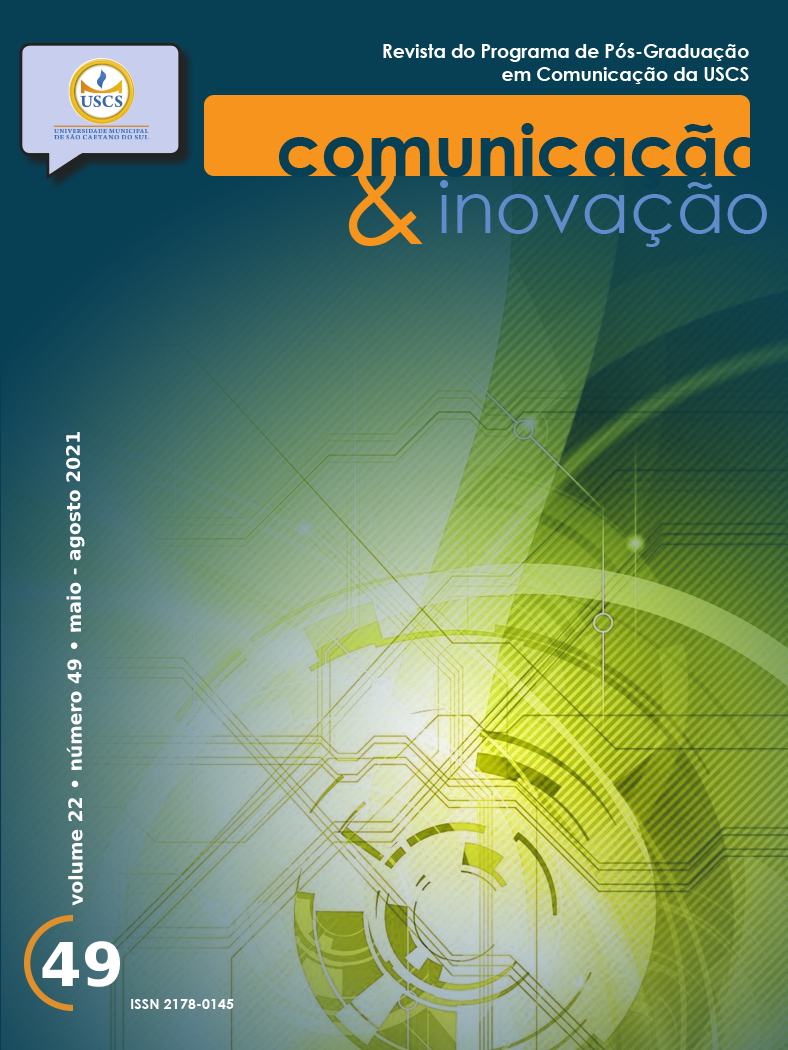Por Uma Agenda de Pesquisa em Comunicação, Democracia e Ecologia Política
DOI:
https://doi.org/10.13037/ci.vol22n49.7348Keywords:
comunicação pública, sustentabilidade ambiental, ecologia políticaAbstract
A recent democratic innovation in Brazil, the river basin committees promote the expansion of participation in the environmental management. However, they present obstacles that, in order to be adequately addressed, cannot ignore the contribution of the communication sciences in the design of strategies and dynamics for the optimization of the quality of public deliberation. This text develops an original theoretical articulation with the objective of contributing to the formulation of a research agenda in search of the necessary answers to the advancement of knowledge about the communication of the committees in connection with democracy and political ecology.
Downloads
References
ABERS, R. N.; KECK, M. E. Practical authority: agency and institutional change in Brazilian water politics. Oxford: Oxford University Press, 2013.
ANA. AGÊNCIA NACIONAL DE ÁGUAS. Comitês de bacias hidrográficas estaduais. Brasília, DF: 2017. Disponível em: http://www.cbh.gov.br/. Acesso em: 2 ago. 2017.
AVRITZER, L. The different designs of public participation in Brazil: deliberation, power sharing and public ratification. Critical Policy Studies, v. 6, n. 2, p. 113-127, 2012.
BARBOSA, M. C.; MUSHTAQ, S.; ALAMA, K. Integrated water resources management: are river basin committees in Brazil enabling effective stakeholder interaction? Environmental Science and Policy, n. 76, p. 1-11, 2017.
BAVEL, J. J. et al. Using social and behavioural science to support COVID-19 pandemic response. Nature Human Behaviour, v. 4, p. 460-471, 2020.
BENFORD, R. D.; SNOW, D. A. Framing processes and social movements: an overview and assessment. Annual Review of Sociology, v. 26, p. 611-639, 2000.
BRASIL. Pretendida contribuição nacionalmente determinada (iNDC) do Brasil. Brasília, DF: 2016. Disponível em: http://www.mma.gov.br/images/arquivos/clima/ convencao/indc/BRASIL_iNDC_portugues.pdf. Acesso em: 2 ago. 2017.
______. Lei federal 9.433. Institui a Política Nacional de Recursos Hídricos. Brasília, DF: 1997.
BROSSARD, D.; LEWENSTEIN, B. V. A critical appraisal of models of public understanding of science: using practice to inform theory. In: KAHLOR, L.; STOUT, P. (eds.) Communicating science: new agendas in communication. New York: Routledge, 2009. p. 11-39.
CARVALHO, J. L.; JACOBI, P. R. Governança da água no Estado de São Paulo: um estudo de caso do comitê de bacias hidrográficas dos rios Sorocaba e Médio Tietê. In: JACOBI. P. R. (org.) As múltiplas dimensões do desenvolvimento e os desafios de políticas sustentáveis. São Paulo: Annablume, Fapesp, 2014. p. 157-181.
COAFFEE, J.; LEE, P. Urban resilience: planning for risk, crisis and uncertainty. London: Palgrave Macmillan, 2016.
COLLINS, H. M.; EVANS, R. Rethinking expertise. Chicago: University of Chicago Press, 2007.
COLLINS, K. et al. A systemic approach to managing multiple perspectives and stakeholding in water catchments: some findings from three UK case studies. Environmental Science and Policy, 10, 564-574, 2007.
DUARTE, J. Sobre a emergência do(s) conceito(s) de comunicação pública. In: KUNSCH, M. M. K. (org.) Comunicação pública, sociedade e cidadania. São Caetano do Sul, SP: Difusão, 2011, p. 121-134.
HABERMAS, J. Teoria do agir comunicativo. São Paulo: Martins Fontes, 2011.
HAMPTON, G. Narrative policy analysis and the integration of public involvement in decision making. Policy Sci, n. 42, p. 227-242, 2009.
HULST, M.; YANOW, D. From policy “frames” to “framing”: theorizing a more dynamic, political approach. American Review of Public Administration, v. 46, n. 1, p. 92-112, 2016.
IRVIN, R. A.; STANSBURY, J. Citizen participation in decision making: is it worth the effort? Public Administration Review, n. 64, v. 1, p. 55-65, 2004.
JACOBI, P. R.; FRACALANZA, A. P. Comitês de bacias hidrográficas no Brasil: desafios de fortalecimento da gestão compartilhada e participativa. Desenvolvimento e Meio Ambiente (UFPR), v. 11-12, p. 41-49, 2005.
JENSEN, E.; BUCKLEY, N. Why people attend science festivals: interests, motivations and self-reported benefits of public engagement with research. Public Understanding of Science, v. 23, n. 5, p. 557-573, 2014.
KOONTZ, Tomas M. et al. Adaptive institutions in social-ecolo.gical systems governance: A synthesis framework. Environmental Science and Policy, n. 53, p. 139-151, 2015.
LATOUR, B. Políticas da natureza: como associar as ciências à democracia. São Paulo: Unesp, 2019.
MAIA, R. C. M. How Honneth’s recognition theory can further empirical deliberation research. Political Communication Report, v. 1, p. 1-8, 2016.
MAIA, R. C. M.; LARANJEIRA, M. D.; MUNDIM, P. S. The role of experts across two different arenas in a deliberative system. Journal of Public Deliberation, v. 13, p. 1-32, 2017.
MARQUES, A. C. S. As intersecções entre o processo comunicativo e a deliberação pública. In: ______ (org.) A deliberação pública e suas dimensões sociais, políticas e comunicativas. Belo Horizonte: Autêntica, 2009. p. 11-28.
MARQUES, A. C. S.; MAFRA, R. L. M.; MARTINO, L. M. S. Um outro olhar sobre a comunicação pública: a constituição discursiva de sujeitos políticos no âmbito das organizações. Dispositiva, v. 6, p. 76-92, 2017.
MATOS, H. A comunicação pública na perspectiva da teoria do reconhecimento. In: KUNSCH, M. M. K. (org.) Comunicação pública, sociedade e cidadania. São Caetano do Sul, SP: Difusão, 2011, p. 39-59.
NYKVIST, B., HELAND, J. Social-ecological memory as a source of general and specified resilience. Ecology and Society, v. 19, n. 2, 47, p. 1-12, 2014.
ONU. Framework Convention on Climate Change. Paris Agreement. Paris, 2015.
POLINO, C.; CASTELFRANCHI, Y. Percepción pública de la ciencia en Iberoamérica. Evidencias y desafíos de la agenda de corto plazo. Revista Iberoamericana de Ciencia Tecnología y Sociedad, v. 14, p. 113-134, 2019.
PRIEST, S. Critical science literacy: what citizens and journalists need to know to make sense of science. Bulletin of Science, Technology & Society, v. 33, n. 5-6, p. 138-145, 2013.
STEINER, J.; JARAMILLO, M. C.; MAIA, R. C. M.; MAMELI, S. Deliberation across deeply divided societies: transformative moments. Cambridge: Cambridge University Press, 2017.
SUSSKIND, L. Water and democracy: new roles for civil society in water governance. International Journal of Water Resources Development, v. 29, n. 4, p. 666-677, 2013.
WEBER, M. H. Nas redes de comunicação pública, as disputas possíveis de poder e visibilidade. In: WEBER, M. H.; COELHO, M. P.; LOCATELLI, C. (orgs.) Comunicação pública e política: pesquisas e práticas. Florianópolis: Insular, 2017. p. 23-56.
VIGNOLA, R.; MCDANIELS, T. L.; SCHOLZ, R. W. Governance structures for ecosystem-based adaptation: Using policy-network analysis to identify key organizations for bridging information across scales and policy areas. Environmental Science & Policy, n. 31, p. 71-84, 2013.
Downloads
Published
How to Cite
Issue
Section
License
Copyright (c) 2021 Danilo Rothberg

This work is licensed under a Creative Commons Attribution-NonCommercial-NoDerivatives 4.0 International License.
Conforme consta nas normas da revista, o envio de artigos e textos solicitando a apreciação com a finalidade de publicação na Comunicação & Inovação, configura a cessão de direitos autorais.
No caso de fotos e imagens, o autor deve providenciar documento que ateste a permissão em termos de direitos autorais.





